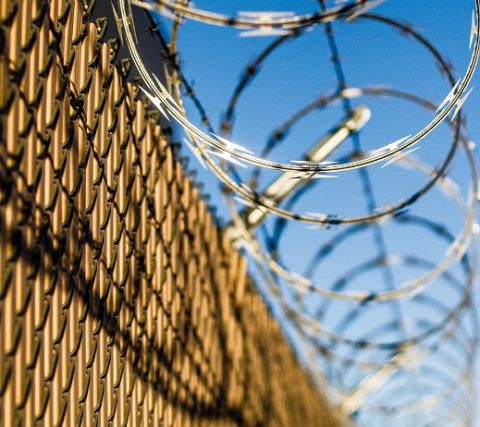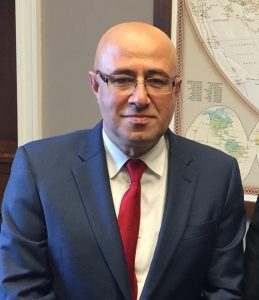Washington Kurdish Institute
March 6, 2018
It was not too long ago when the whole world was watching the people of Iran rising against the country’s dictatorial Islamist regime. These Iranian protests, which occured from December 28, 2017 to January 7, 2018, were the first time that protesters called for a change in the governing system of Iran. The people not only chanted slogans against the regime’s Supreme Leader but they also expressed anger over the regime’s policies for the past 39 years — policies of corruption, repression, and martial law. The international community and media followed the protests, looking into how the regime imposed darkness and poverty on its people — however this coverage and investigation was still limited. And now that the protests have ended, the world (the international community and media) stand silent. During the first week of the protests, Iranian security forces detained thousands of protesters in eighty cities, as a means to control the “unrest,” jailing and torturing to death civil rights activists and organizers. The Islamic Revolutionary Guard Corps (IRGC) and other militias were deployed in the cities to stop further protests as the regime’s Mullas approved the death penalty for protestors. And within the first two weeks, the regime killed more than 35 protestors. In the aftermath of the protests, thousands remain in Iranian jails awaiting trial, as many of these protesters are tortured and killed.
The Kurds of Iran are no stranger to this type of behavior by the Iranian theocracy. For decade upon decade the Kurdish people of Iran have faced persecution not only by the current Islamist regime which came to power after the 1979 revolution but also well before this time period, during the early years of the Iranian nation-state. In these most recent protests, the Kurds once again rose up with their fellow Iranians to stand against the brutality of this authoritarian regime, even despite fears that the regime’s crackdown would be much harsher on Kurdish protesters – a reality Kurdish activists have lived with for generations. Almost every week since the uprising began, more and more Kurds, including many Kurdish students, are being detained by the Iranian government for their alleged participation in the protests. Those jailed are also often killed. Despite its outwardly Islamist ideology, the current Iranian regime is no stranger to playing the Persian nationalist card as a means to delegitimize the Kurdish protesters, calling them “separatists” or “terrorists” for wanting equal cultural and political rights. This anti-Kurdish oppression is not just limited to activists or political movements: it even targets normal, everyday aspects of Kurdish life, such as the destruction of lakes and forests within Kurdish areas. In the past two years tens of Kurdish border porters (known as Kolbars) have been shot dead by Iranian border guards while transferring smuggled goods for Iranian businessmen. These Kolbars often undertake this dangerous work out of desperation, as the Kurdish areas where they live suffer from dire poverty and large unemployment rates. The Iranian regime’s animosity against Kurdish people and their leaders spans beyond its own borders; for example, within the past four decades the regime has assassinated a number of respected Kurdish leaders in Europe, including the General Secretary of the Democratic Party of Iranian Kurdistan Abdul Rahman Ghassemlou.
The Washington Kurdish Institute (WKI) spoke to the Representative of the Society of Revolutionary Toilers of Iranian Kurdistan (Komala) to United States Mr. Salah Bayaziddi. The Kurdish party Komala is one of the oldest parties in Iran. The party aspires to obtain rights for the Kurdish people of Iran. The founder of Komala was Foad Mostafa Soltani who was killed by the Iranian regime in 1979. Beside armed struggle, the Komala Party has been an active in the political and civic arena, defending the rights of persecuted people in Iran via its Central Committee headed by Abdullah Mohtadi.
WKI: What is the situation like in Iran now after the protests?
Salah Bayaziddi: The situation in post-protest Iran still should be described as intense and unstable because daily pocket protests and other new forms of disobeying the Islamic regime are taking place around country. Women still are playing a major role during this period and we are witnessing women removing their head scarfs and they are waving their white head scarfs in public and protesting compulsory hijab in Iran. Kurds and other ethnic groups are also playing another major role while Kurds are using their near four decades experience in fighting Iranian authority in all forms of urban struggle and civic disobedience these days. Plus, workers, youths, and all different sects of Iranian society are continuing to be unhappy and are determined to get their share of wealth of this country during post-protests Iran.
WKI: Has the regime made any reforms after Iranian protesters demanded a better economic situation?
Salah Bayaziddi: The Iranian regime is the same as before. Prior to every election or following every protest, it has made a lot of promises about reforms or providing a better life for Iranians but this promise has remained as worthless words and nothing has been changed. In fact, Iranians are becoming poorer and the level of poverty is becoming lower than any country in the region and beyond. People have lost their trust and they don’t believe any promises made by the Iranian regime and they are looking for change instead. What is next for the Kurdish parties? As I mentioned earlier Kurdistan has been playing a major role in defying the Islamic regime of Iran since 1979 and the Kurds are the only major group who boycotted a referendum for an Islamic system in 1979. Kurdish political parties have been taking a major step these days by forming a “Center for cooperation of Kurdish political parties – Iran” and they are in good discussions for more cooperation and joint works in their struggle against the Iranian regime and achieving their national rights. It is a first step but a major step and we are looking for a united front of a strong Kurdish bloc in any upcoming developments in Iran.
WKI: Do you think the Iranian regime has decreased its meddling in the affairs of Iraq, Syria, Lebanon, and Yemen after the protests demanded the government focus more on domestic issues rather than sending money and resources for conflicts abroad?
Salah Bayaziddi: The Iranian regime is continuing to support terrorist groups in the region and beyond, forming and arming Shi’a militia groups in Iraq, Syria, Lebanon, and Yemen and meddling in the internal affairs of all of these countries and many more. The Iranian people on many occasions have demanded that their government stay away from the affairs of these countries and to not spend their wealth on the adventurist policies of Shi’a clergies and what many are calling “the Shi’a Crescent.” But the Iranian regime is following a policy of reviving a Shi’a empire in the region and for sure not obeying or giving into demands from its people. Supporting these proxy wars has become a main part of the Iranian regime’s existence for last four decades.
WKI: Are you satisfied with the reaction/policies of the U.S. since the break out of the Iranian protests?
Salah Bayaziddi: While the Obama administration remained silent during the so-called “Green Movement” in 2009 and chose to not say any word in supporting the Iranian uprising against the ruthless Islamic regime of that country, we saw a more active role in supporting Iranian protests by the current U.S. administration of president Trump. The U.S. policy was more active during this period especially in the United Nations, bringing more attention to the international community about what was going on in Iran and how ruthlessly the Iranian regime was cracking down on the peaceful protests. I know international affairs and especially regional alliances have become more complex since the arrival and meddling of Russia in the Middle East, especially with their alliance with the Iranian regime. But still the U.S. can play more of a role in supporting the Iranian people in their struggle against the mullahs and the regime of Tehran. The U.S. can support opposition groups, especially Kurdish political parties, in weakening the Iranian regime where it ultimately will have an effect on the regime’s abilities to suppress and crush its people. This more active policy for the U.S. will also curb the Iranian regime’s power of maneuvering in the region and forming and arming Shi’a militia groups in Iraq, Syria, Lebanon, and Yemen and meddling in the internal affairs of all these countries.


